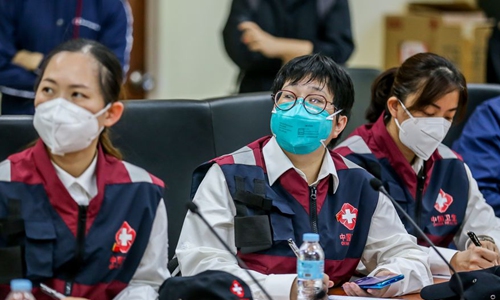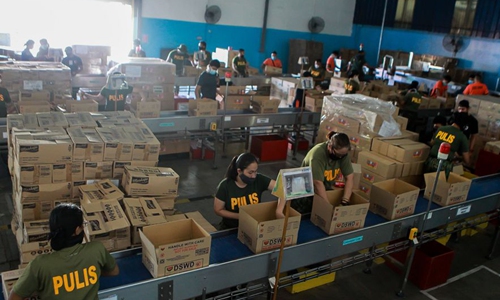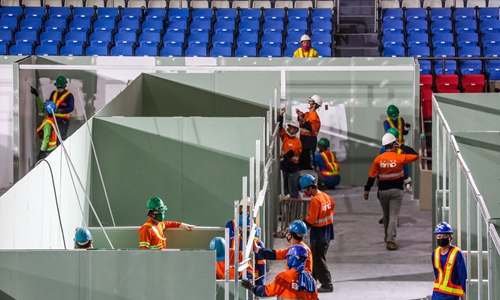HOME >> WORLD
Philippines wants to learn from Chinese experts on how to stop COVID-19: senior health official
Source:Xinhua Published: 2020/4/7 12:39:43

Members of the Chinese medical team attend a briefing session with DOH officials at the Philippine Department of Health (DOH) headquarters in Manila, the Philippines, on April 6, 2020. (Xinhua/Rouelle Umali)
"From the Chinese experts, we'd like to ask a lot of things," Philippine Health Assistant Secretary Kenneth Ronquillo said after a briefing session with Chinese medical experts on Monday.
The 12-member Chinese medical expert team dispatched by the Chinese government arrived in Manila on Sunday to share their learnings on how to handle COVID-19 cases with their Filipino medical counterparts.
"We'd like to see how China did contact-tracing and surveillance, that's very important," Ronquillo said after the Department of Health staff briefed the Chinese experts on the COVID-19 situation in the country.
Ronquillo said the Philippines also wants to see how to improve diagnostic capacities, including other ways of testing. "I believe that there are other ways to testing that can be introduced here based on your experience," he added.
According to the Philippine government, now there are around 10 laboratories that can proceed with the COVID-19 testing, among which the largest one can conduct nearly 1,000 tests daily. The Philippine government is aiming to increase the testing capacity in the country in the future.

Members of the Philippine Coast Guard, policemen and volunteers wearing face masks prepare relief goods as aid for communities under enhanced community quarantine at a government warehouse in Pasay City, the Philippines on April 2, 2020. (Xinhua/Rouelle Umali)
Moreover, Ronquillo said that the Philippines wants to learn the "good practices and best practices" that China implemented to isolate and contain COVID-19 patients, including the proper way of doing things like personal hygiene, experiences like putting up the personal protective equipment.
"We'd like to see and learn a lot of things from the Chinese experts," Ronquillo added.
Ronquillo said the team's wealth of frontline experience is something that the Philippines wants to adapt and duplicate in its local fight against the disease.
"We'd like to see this experience be brought here in the Philippines so we should be able to learn and eventually curtail and fight COVID-19 here in the Philippines," he added.
Another thing that the Philippines also wants to learn is about the effectiveness of Chinese traditional medicine in treating COVID-19 patients.
"That's what we want to learn, that's what we want to see, how you did it in China. We want to see if it's also practical and adjustable and usable here in the Philippines," he said.

Construction workers wearing face masks assemble partition walls as they convert the Rizal Memorial Coliseum into a quarantine spot to contain the spread of novel coronavirus in Manila, the Philippines on April 3, 2020. (Xinhua/Rouelle Umali)
"We hope to see these experiences, medical management in terms of treating patients. We've seen how China managed to really lower down COVID-19 cases and we're interested to know all of these and see if it's adjustable and practical to adopt it here in the Philippines and actually do it," he added.
During their stay in the Philippines, the Chinese experts are expected to visit COVID-19 hospitals, laboratories and community quarantine facilities, including those in the villages.
"We'd like them to see our capacities for laboratory testing, and we'd like to see how they do social distancing measures. We'd all like to see how they did it in China," he added.
According to Ronquillo, the team will also meet health officials both in Metro Manila and outside the capital.
"They'll be meeting a lot of different types of professionals not only medical professionals that will actually solidify our plans here in the Philippines to really stop or kill COVID-19," Ronquillo said.
The Philippines now has 3,660 COVID-19 cases, including 163 deaths. So far, the Department of Health said 73 people have recovered from the highly infectious disease.
Posted in: ASIA-PACIFIC